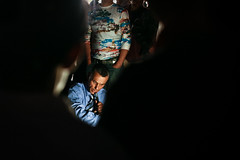There's a difference between good writing and good storytelling. There are a number of well-regarded wordsmiths out there who can't tell an interesting story to save their lives. And plenty of guys who'd keep you fascinated telling tales at a campfire, who couldn't write a coherent sentence. There's some injustice in the fact that the first group is considered superior to the second.Read the whole thing. Walker goes on not only to list a number of those tools, but to show how Raymond Chandler puts them to good use in the opening paragraph of The Big Sleep. His point is a very legitimate one. Personally, I'm consistently frustrated both by storytellers who scribble at an eighth-grade level and wordsmiths so devoid of narrative sense that they make Proust appear pulse-pounding. Genre lovers need a marriage of both. Our scribes ought to make us weep with the beauty of their craft while setting our heads spinning with unexpected plot twists.
I've known a couple fellows myself, in my time, who could keep an audience mesmerized, even though they butchered the English language. They made good use of the verbal storyteller's tools -- intonation, facial expression, changes in volume, dramatic pauses, gestures.
But the problem is that when a storyteller sits down to write a story on paper, he loses most of those tools.
(Picture: CC 2009 by Tomasz Kulbowski)



3 comments:
Good article.
I'll repeat what I said there, though. I think that Chandler's language (and more literary language by people like VanderMeer, Mieville, Chesterton, Tolkien, Murakami, Wolfe, Valente, and dozens of others) is excellent, and well crafted. I think that all these folks give us delicious prose, veering at moments towards prose-for-prose sake, akin to the painterly backgrounds of Jackson's Lord of the Rings trilogy. This is good, and requires great craft.
Yet to continue my analogy, sometimes a blank background serves better. So too, I think some authors actually have a prose style that is very effective at *not* drawing attention to itself, that seeks to be so normal-feeling that a reader never takes the time to notice it, only the story. This, too, takes craft. It's just a different kind of craft.
This is probably the default writing style for folks like Sanderson, Moon, Scalzi (when he's not making brilliant jokes), and McCaffrey. It has a different purpose, but that isn't to say that it has no purpose.
A litmus test, for me, is how one remembers a text. When I think of Chandler, Tolkien, or VanderMeer, I link the key scenes to the words that embody them:
"She tried to sit in my lap, but I was standing up at the time."
"'I will take the ring,' he said, 'though I know not the way."
(Or "Such are the deeds that turn the course of history; small hands do what they must, while the eyes of the great are elsewhere." Or "on the lands of Lothlorien, there was no stain.")
"He sits in the rowboat next to her and watches the end and beginning of history."
On the other hand, I tend to remember other stories in terms of actions and plot, divorced from the language that expresses it.
So in Sanderson--That sword that was made to smite evil, but given limited intelligence so that it understands the concept "smite" better than "evil"!
Or in Moon--that space battle where within 15 minutes so much ordinance was in the air that astronavigation became more important than the ability to shoot at people.
Or Niel Stephenson (not mentioned above)--that early scene in Anathem in which monks use carefully calibrated singing to overcome the friction coefficient and get their gigantic bells to start moving.
*land of Lothlorien
Post a Comment